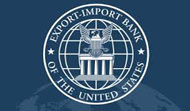
To complicate things the Ex-Im Bank is a misnomer. It has nothing to do with imports and is not a bank. It provides loan guarantees to private banking institutions on behalf of American exporters. It also provides credit insurance. Everything it does, it does so at market rates. It generates a profit.
Imagine for a moment any federal agency generating a profit for the taxpayer?
This is needed because private American financial institutions will not collaterize foreign receivables or inventory. Without this, legions of small businesses and entrepreneurs that want to export their products and services would have to be independently wealthy individuals to compete. This would eliminate the vast majority of our exporters and be an incredible setback to our economy and job creation.
Ex-Im Bank’s mission is pretty simple: enable U.S. companies — large and small — to turn export opportunities into real sales that help to maintain and create U.S. jobs and contribute to a stronger national economy.
A recent PBS report noted that since its establishment in the wake of World War II, “when crippled foreign markets weren’t strong enough to purchase American products, the Export-Import Act of 1945 has been renewed by Congress 16 times without a political fight as intense as this year’s.”
It’s really hard to understand why this year’s reauthorization battle is taking place.
Since 2009, Ex-Im Bank claims that it’s sustained 1.2 million private sector jobs. And Ex-Im Bank has supported more than $567 billion of U.S. exports, primarily to developing markets worldwide.
But somewhere along the line, Ex-Im’s loan guarantees were deemed government handouts. This simply is not the case.
In fact, Ex-Im Bank is self-funded, making money on interest on loan guarantees and credit insurance it provides on behalf of large and small businesses that manufacturer and export American products. Ex-Im estimates it returned more than $1 billion to the U.S. Treasury in fiscal year 2013.
The other rap on Ex-Im is that its loans primarily benefit large corporations like Boeing and their foreign airline customers. Yes, that takes place, but a growing part of Ex-Im’s portfolio is small and medium-sized businesses, like mine.
If Boeing and airlines are helping to carry freight overseas for U.S. manufacturers, they are helping entrepreneurs make money, building the U.S. economy and supporting thousands of jobs.
The biggest argument against Ex-Im is that private sector banking should make these loans without Ex-Im’s guarantees or credit insurance.
In fact, Rep. Kevin McCarthy, R-Calif., told Fox News that “one of the biggest problems with government is they go and take hard-earned money so others do things the private sector can do. That’s what the Ex-Im Bank does.”
Ex-Im Bank does not compete with private sector lenders. It provides export financing products that fill gaps in trade financing. It assumes credit and country risks that the private sector is unable or unwilling to accept.
As an exporter I know this firsthand. This really penalizes small business exporters who are willing to take a risk to open new foreign markets and create demand for U.S. goods.
A representative for Caterpillar told The Wall Street Journal: “For the U.S. to close the Ex-Im Bank in this environment is surrendering export markets and economic growth in the U.S.”
I completely agree. If we are to compete on a level playing field with other nations, U.S. exporters need access to capital and an organization that will guarantee credit lines.
Both political parties need to spend more time understanding the benefits that Ex-Im Bank brings to our country. Ex-Im Bank must do a better job explaining what it does and focus its services more on small businesses that do not have any other alternative. Perhaps it can start by changing its name, since it helps to perpetuate the misconception.
Not reauthorizing Ex-Im is a big mistake with far-reaching implications, unless Congress can find another way to create 1.2 million jobs and return $1 billion a year to the Treasury. These kinds of programs are in very short supply.
© 2014 Moneynews. All rights reserved.
SEP



